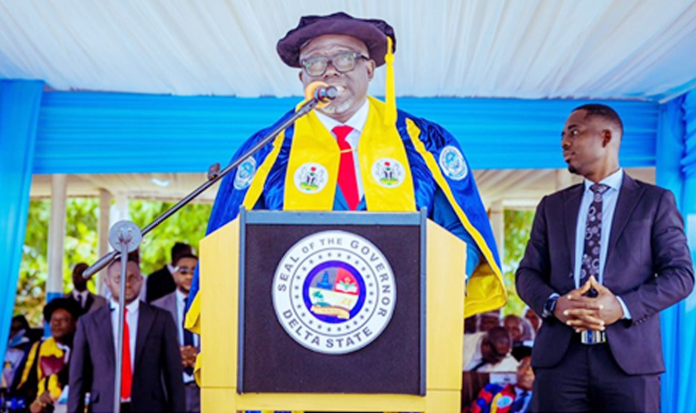BY IFEANYI UWAGWU
EDUCATION, globally acknowledged as a fundamental human right and a driver of development, has long been a cornerstone of Delta State’s governance philosophy. With each successive administration, the state has demonstrated a consistent commitment to building a sustainable and inclusive education system.
However, in the past two years, under the current administration, that commitment has taken a bold and transformative turn.
Since his emergence at the polls in 2023, Governor Oborevwori has approached education not just as a sector to be funded, but as a human-centred enterprise requiring empathy, vision, and strategic foresight. His administration’s flagship MORE Agenda has become the vehicle for translating campaign promises into measurable outcomes, touching every level of the education value chain.
Retaining Experience, Rewarding Dedication:
One of the administration’s first and most impactful policy decisions was the extension of teachers’ retirement age from 60 to 65 years and service years from 35 to 40. This progressive move places Delta State among the few Nigerian states to implement such reform, recognising the irreplaceable value of experienced educators.
Beyond being a nod of respect to long-serving teachers, it ensures continuity in teaching quality, mentorship for younger colleagues, and a deeper sense of purpose for education professionals nearing retirement.
Additionally, the Oborevwori government wasted no time in addressing legacy issues that had long frustrated teachers and retirees. Within the first year, it cleared pension and gratuity backlogs, paid outstanding promotion arrears, and reaffirmed a commitment to paying salaries promptly. These actions restored trust in the system and sent a clear message: educators matter.
Expanding Accessories and Strengthening Capacity:
Governor Oborevwori has not only focused on those already in the system but has also made strategic moves to expand access to education, especially in underserved areas.
Recognising the persistent teacher- shortage, the administration embarked on a wide-reaching recruitment drive. Over 2,000 positions were filled across primary schools—1,630 of them by qualified teachers, while hundreds of others were employed as clerical assistants, non-academic support staff, cleaners, and security personnel. This influx of human resources is already making a tangible difference in classroom sizes, student engagement, and rural education delivery.

Elevating the Tertiary Education Landscape At the tertiary level:
Governor Oborevwori has demonstrated a forward-thinking approach to infrastructure development and institutional reforms. Notably, he approved the transformation of the proposed Orerokpe Technical College into a Faculty of Management Sciences under the now-renamed Southern Delta University. This bold rebranding and expansion initiative signals a diversification of academic programmes and opportunities for prospective students, especially those from Delta Central and Southern senatorial zones.
The administration’s investment in Delta State University (DELSU), Abraka, has been equally commendable. From commissioning a new Microbiology Laboratory Complex to initiating the revocation and re-award of the long-abandoned Senate Building, Governor Oborevwori has ensured that higher education infrastructure is not left to decay. His consistency in paying workers’ salaries and benefits also sets a high bar in institutional governance.

Celebrating Excellence, Upholding Equity:
Beyond brick-and-mortar achievements, Governor Oborevwori has prioritized celebrating academic excellence. His approval of automatic employment for the overall best graduating student from DELSU, Okwa Favour Oghenemine, a Mathematics graduate with a CGPA of 4.95, sent a powerful message: in Delta State, hard work and brilliance will always be recognised.
In a society where the youth are increasingly tempted to forsake education for short-term gain, this gesture reaffirmed the value of intellectual achievement.
In another responsive move, following complaints and investigations, the Governor ordered the refund of unauthorised fees collected from students in the Colleges of Nursing in Asaba and Sapele. This single decision, which benefitted 162 students, demonstrates the administration’s sensitivity to the economic pressures families face.
In the same spirit, a 25 per cent reduction in acceptance fees across all state-owned tertiary institutions was approved, further easing the financial burden on students.

Infrastructure and Future Readiness:
The 2025 budget reflects Governor Oborevwori’s future-focused education strategy. With a capital expenditure of ₦32 billion earmarked for the Ministry of Higher Education, projects such as the construction of student hostels in DELSU and Ozoro, the Provost’s Lodge at Mosogar College of Education, and administrative infrastructure at the School of Marine Technology, Burutu, are already underway. Even more visionary is the plan to procure a fishing trawler for the Maritime Polytechnic in Burutu—a move that combines hands-on learning with income generation for the institution.

Partnerships and Private Sector Growth:
The Governor’s tenure has also seen a rise in private and federal institutions in Delta State, thanks to a long-standing pro-business education environment cultivated by past and present administrations.
The commissioning of the Federal Medical Centre’s College of Nursing Sciences at Onicha-Uku underscores effective collaboration between state and federal entities in promoting healthcare education and improving access.
In 2024, the state approved the establishment of a second College of Health Technology in Ovrode, Isoko North—a move aimed at addressing the rising demand for qualified health professionals while decentralising access to education.
Strengthening Governance Structures:
Institutional stability is essential for sustained progress. By reconstituting the Governing Councils of key institutions like DELSU, Otefe-Oghara Polytechnic, Burutu Polytechnic, and Mosogar College of Physical Education, Governor Oborevwori has reinforced accountability, leadership, and institutional autonomy—key drivers of innovation and efficiency in tertiary education.
A Vision Rooted in Legacy:
Two years into his administration, Governor Sheriff Oborevwori has not only continued the legacy of his predecessors but has elevated Delta State’s education sector to new heights. His vision combines empathy with execution, policy with passion. His leadership has inspired hope among educators, students, and parents, while positioning Delta State as a model of education-centred development in Nigeria.


